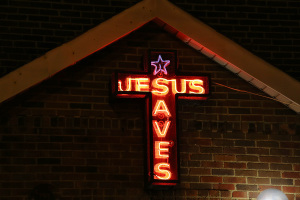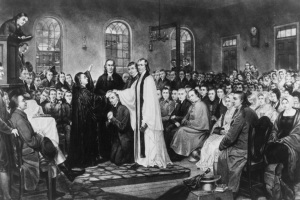'People of Color Blog Too' — Christian Blogger Aims to Diversify the 'Lists'

They pop up every once in a while: top 10 lists. The "Top 10 Christian Bloggers," the "Top 10 Christian Leaders," the "Top 10 Female Christian Bloggers," and so forth. But these lists, meant to highlight some of the most thoughtful, influential and unique voices in Christianity, frequently fail to represent the contributions of bloggers of color who have much to share about their experiences, observations and thoughts related to their faith.
That's what Christena Cleveland, a social psychologist who also happens to be a Christian, blogger and woman of color, has noticed (as have others). This week, she put out her own list titled, "People of Color Blog Too (25 Christian Blogs You Should Be Reading)."
"I think that the Body of Christ is only going to work well when we are all hearing from each other, and when the arm doesn't get more prominence than the nose or the foot," Cleveland told The Christian Post when asked about the list. "I think that the way that it's set up now is there are certain voices that do enjoy more prominence.
"The goal of that post was really just to make people aware of other voices in the Body of Christ. I intentionally put together a list of people that was very diverse even within itself, so everyone is a person of color. I tried to represent a lot of different ethnic groups, although of course I couldn't do all of them just in terms of feasibility. But then I also tried to represent a lot of different theological and ecclesiological traditions. Again, (the) goal is being the Body of Christ and not just sitting out in camps with people who are just like us and think like us."
Cleveland, also an author (Disunity in Christ: Uncovering the Hidden Forces that Keep Us Apart), pointed in her blog post to Christian Platt's 2013 reader's choice list of the "25 Christian Blogs You Should Be Reading" as inspiration for drafting her own. She pointedly notes on her site, "... I'm the only person of color on the list. Apparently, the thousands of people who voted in this poll don't read the challenging, insightful and prophetic blog posts that people of color generate on a regular basis."
As Platt explains on his Patheos blog: "After more than 33,000 hits, 400 nominations and thousands of votes, we have the 'Reader's Choice list of 25 Christian Blogs You Should Be Reading'. I was particularly pleased to see so many women represented in the list this year. Could be much more culturally diverse, but with respect to gender and theological views, it does cover quite a bit of ground."
For Cleveland, "The results of this poll are unsurprising and definitely not a fluke. Rather, they are indicative of the larger problem of privilege within American Christianity."
She explained the concept of privilege in a recent guest post published by Rachel Held Evans, another popular blogger, columnist and author (A Year of Biblical Womanhood: How a Liberated Woman Found Herself Sitting on Her Roof, Covering Her Head, and Calling Her Husband "Master"):
"There's so much talk of a 'new evangelicalism' that is younger, more diverse, less rigid and more open to different viewpoints than the old evangelicalism. But I can't help but notice that the largest, more influential platforms within this so-called new evangelicalism typically give voice to people who have long had a voice. Representatives from the same group of privileged people who dominated conversations in the 20th century continue to dominate the conversations about current issues such as modesty culture, immigration reform, relevancy in culturally-diverse America, gender issues, and more. Privileged folks – whites, males, the educated/upwardly-mobile, and others who benefit from living in a society that accommodates rather than alienates them – continue to stand front and center in pulpits, on blogs and at conferences. Meanwhile, the stories and voices of the disenfranchised, people of color, the informally educated, and the undocumented are woefully underrepresented. The new evangelicalism looks eerily similarly to the old one.
"By participating in an evangelical world that mirrors the inequitable power structures of mainstream America, we undermine our Christian witness. More to the point, the fact that privileged folks continue to enjoy the largest voice in evangelical Christianity directly contradicts the example of Jesus, who masterfully used his privileged voice to draw attention to and give voice to the oppressed voices of his day. Jesus used his platform to create space for the bleeding woman to share her story, for the little children to come swap stories with him, and for alienated ethnic minorities to talk about their experiences and perspectives on faith."
While encouraging her readers to support these bloggers, Cleveland also calls on her fellow "top 25-ers" to "devote the next year to promoting diverse voices. This is how we steward our (powerful) voices. This is how we emulate Jesus."
Cleveland's "People of Color Blog Too (25 Christian Blogs You Should Be Reading)," which includes Eugene Cho and Austin Brown, has not only attracted a strong response among other bloggers, but has led to readers sharing their own suggestions for a diversity of Christian voices online.
"Thanks for including me on the list. No list is perfect or complete (a claim which I have actually never [heard] any blog list make), so while I look forward to how you will respond to the critiques, this is by far the most broadening list I have seen in a while," wrote Bruce-Reyes-Chow, an author and blogger.
Read "People of Color Blog Too (25 Christian Blogs You Should Be Reading)" to see the full list (http://www.christenacleveland.com/2013/08/people-of-color-blog-too/).





























